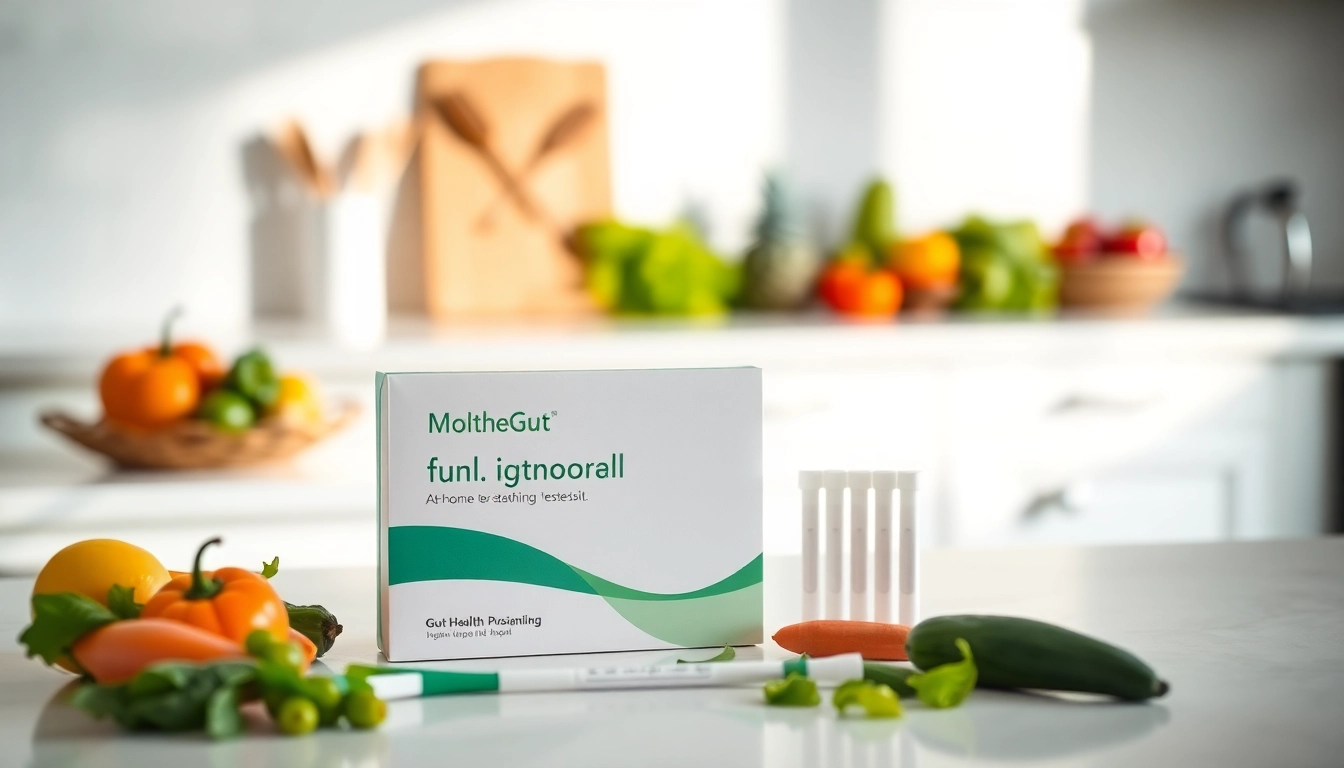Understanding the At-Home Gut Health Test
What is an At-Home Gut Health Test?
An At-Home Gut Health Test is a diagnostic tool that enables individuals to assess their gastrointestinal health from the comfort of their own home. These tests usually analyze gut microbiota, which refers to the trillions of microorganisms residing in the digestive tract. By examining these microbial communities, users can obtain insights into how their gut health may be impacting their overall well-being. This information can serve as a valuable resource for identifying potential health concerns, such as digestive disorders, food intolerances, or imbalances in gut flora.
Benefits of Testing Your Gut Health at Home
Testing your gut health at home carries numerous advantages. First and foremost, it offers convenience, allowing you to collect samples in a familiar and relaxed environment without the pressure of a clinical setting. The process typically requires only simple procedures, such as stool collection, which can be done at your own pace.
Additionally, at-home tests often provide results in a matter of days, enabling swift access to critical information about your digestive health. Many tests also come equipped with user-friendly online platforms or mobile apps, making it easy to understand the results and access personalized recommendations based on your findings.
Moreover, utilizing an At-Home Gut Health Test empowers individuals to take proactive steps toward improving their health. By identifying specific gut imbalances or issues, users can make informed dietary and lifestyle changes tailored to their unique needs.
Common Gut Issues Detected by At-Home Tests
At-home gut health tests can identify a variety of gut-related issues. Some of the most common problems detected through these tests include:
- Gut Dysbiosis: An imbalance in the gut microbiota can lead to symptoms such as bloating, gas, and digestive discomfort.
- Food Intolerances: Tests can highlight food sensitivities that may be contributing to gastrointestinal distress.
- Inflammatory Conditions: Chronic inflammation within the gut may be indicative of conditions such as irritable bowel syndrome (IBS) or inflammatory bowel disease (IBD).
- Impaired Immune Function: The gut plays a critical role in overall immune health, and tests can reveal deficiencies in the microbial community that support immune function.
How to Choose the Right At-Home Gut Health Test
Key Features to Look For
Choosing the ideal at-home gut health test involves evaluating several key features, including:
- Testing Method: Look for tests that provide accurate and reliable results. Some tests focus on DNA sequencing, while others analyze metabolites.
- Comprehensive Analysis: Select tests that offer a wide range of insights into your gut health, from microbial diversity to potential pathogens.
- Clear Reporting: Ensure that the results are presented in a clear and understandable format, preferably with actionable recommendations.
- Customer Support: Quality support from the test provider can help you interpret results effectively and answer any questions.
Understanding Different Types of Tests
At-home gut health tests vary in terms of the specific aspects they measure. Common types include:
- Microbiome Sequencing Tests: These tests analyze the genetic material of microorganisms in the gut and provide insights into the diversity and composition of the microbiota.
- Metabolic Tests: By measuring various metabolites produced by gut bacteria, these tests can shed light on gut function and health status.
- Food Sensitivity Tests: These kits often require a blood sample and aim to identify reactions to specific foods.
Evaluating Product Reviews and User Experiences
Before committing to an At-Home Gut Health Test, it’s essential to evaluate product reviews and user experiences. Online platforms, such as health forums and review websites, provide valuable insights into the reliability and accuracy of different tests. Look for reviews that detail the testing process, ease of use, clarity of results, and any customer support interactions. Overall satisfaction can often indicate whether a product meets the expectations of its users.
Steps to Successfully Conduct an At-Home Gut Health Test
Preparing for Your Gut Health Test
Preparation is crucial for obtaining accurate results from a gut health test. Here are some key steps to consider:
- Read Instructions: Take the time to thoroughly read all provided instructions. Each test kit may have specific requirements for sample collection and handling.
- Dietary Adjustments: Some tests may require dietary changes in advance. Follow any recommended modifications to ensure your results reflect your usual gut function.
- Timing of Sample Collection: Plan the timing of your sample collection to align with your routine. For example, if a test suggests collecting a stool sample after a specific meal, make sure to schedule accordingly.
Following Instructions for Accurate Results
Once you have your kit, it’s vital to adhere strictly to the instructions provided. This may include:
- Sample Collection: Follow the outlined procedures for collecting samples to avoid contamination.
- Storage and Shipping: Some tests require immediate refrigeration or specific shipping conditions. Ensure you follow these guidelines to preserve sample integrity.
Interpreting Your Test Results Effectively
Interpreting the results of your gut health test can be overwhelming given the complexity of gut biology. Here are actionable tips for understanding your results:
- Understand the Metrics: Familiarize yourself with key metrics provided in the report, such as microbial diversity and abundance of specific bacteria.
- Consult Resources: Utilize supplemental resources or customer support tools provided by the test company for additional guidance on interpreting results.
- Consider Consulting a Professional: If your results indicate potential health issues, it may be beneficial to consult a healthcare professional for further evaluation and advice.
Maintaining Gut Health After Testing
Dietary Changes for Improved Gut Health
After analyzing gut health test results, implementing dietary changes can play a significant role in improving gut health. Consider the following dietary recommendations:
- Incorporate Probiotics: Foods rich in probiotics, such as yogurt, kefir, sauerkraut, and kombucha, can help restore balance to the gut microbiome.
- Include Prebiotic Foods: Foods high in fiber, like fruits, vegetables, and whole grains, serve as fuel for beneficial gut bacteria.
- Avoid Processed Foods: Reducing intake of processed foods, sugar, and artificial sweeteners can minimize gut inflammation.
Supplements and Lifestyle Adjustments
In addition to dietary changes, consider the following supplements and lifestyle adjustments to support gut health:
- Digestive Enzymes: These can aid in the breakdown and absorption of nutrients, particularly for individuals with digestive discomfort.
- Regular Exercise: Physical activity has been shown to positively influence gut health by promoting the growth of beneficial bacteria.
- Stress Management: Implementing relaxation techniques such as meditation or yoga can have a beneficial impact on gut health.
When to Consult a Healthcare Professional
While at-home gut health tests can provide valuable insights, it’s crucial to know when to seek professional help. If your test results indicate significant abnormalities or if you experience persistent symptoms like chronic diarrhea, severe abdominal pain, or unexplained weight loss, consulting a healthcare professional is essential. They can provide further diagnostic testing and tailored treatment options.
Future of At-Home Gut Health Testing
Emerging Trends in Gut Health Testing
The field of gut health testing is rapidly evolving, with several emerging trends poised to change how we approach gut health diagnostics:
- Increased Personalization: Future at-home tests are likely to provide more personalized recommendations tailored to individual gut microbiomes.
- Integration with Health Tracking Apps: As technology develops, we can expect better integration of test data within broader health tracking platforms, allowing users to monitor various aspects of health simultaneously.
- Focus on Preventive Health: More individuals are expected to use at-home testing not only for diagnosis but as a proactive measure to prevent gut health issues.
Technological Innovations to Expect
Advancements in technology will likely provide more accurate and comprehensive gut health tests. Innovations such as:
- AI and Machine Learning: These technologies can enhance data interpretation and improve the effectiveness of personalized health recommendations.
- Wearable Technology: Wearable health devices could soon track gastrointestinal symptoms in real-time, integrating these insights with gut microbiome data for a holistic health view.
Empowering Consumers Through Educational Resources
The growing availability of educational resources will empower consumers to engage actively in their health journeys. Platforms offering insights into diet, lifestyle changes, and understanding gut health will foster informed decision-making. Furthermore, accessibility to webinars, online courses, and community forums will enhance consumer knowledge about maintaining optimal gut health.



